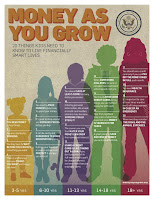Schools are not being allowed the time or resources to teach students sound personal finance. As parents, it is our responsibility to educate our children about handling money wisely. If you teach your child to have a healthy relationship with money it will impact them positively for the rest of their life. It is never too early to begin teaching your children how to handle money and introducing them to fundamentals of personal finance. Here are a few tips.
1. The number one key for our family is that we manage our money for God. Therefore, we are called to only do things with our money that would glorify God. We are also called to be good stewards of his resources. We pass this down to our son through our words and our actions. We make sure to teach our son a commitment to giving. We are helping William establish his own habit of giving financially as well as looking for ways to give our time in service to others too.
2. Use real world situations to talk about money issues. Do not shy away from the topic of money with your children. If they don't learn how to handle money in different situations from you, where are they going to learn? Even if you do not have a perfect history with money, your children can benefit from hearing from your past mistakes and lessons you learned.
3. Start now! As soon as kids can count you can introduce them to money principals. Help them learn to tell the difference between coins and bills. Then move on to help them learn how to save, spend and give. We also feel it is important here to introduce to your children the idea that money comes from doing work. Set your child up on a commissions so that they get paid for the work you agree for them to do in advance. As your child gets older the jobs will change and increase in pay. We used Dave Ramsey's FPU, Jr. kit with our son and found it to be a helpful tool.
4. Discuss other basic personal financial principals with your children as they are ready for them.

- Help your children recognize the difference between needs and wants. Too many people in our society today cannot accurately define these two words.
- Help your children set savings goals. When they are young they may save for a toy and as they grow they may save for their first car.
- When your children are older teach them about long-term savings and the power of compound interest.
- Help your child be a smart shopper. Take children through a store to see the prices of goods then go to garage sales or check online through stores like ebay. Discuss the difference in prices with your children.
5. Once your children are old of enough you can include them in your monthly family budget meetings. This will allow your children to appreciate how spending decisions are made and how much different things from your family budget cost.
6. Let your children make their own money mistakes. They may learn a lot from their mistakes. The key is to keep your children safe, while allowing them to learn to handle money wisely.
No comments:
Post a Comment